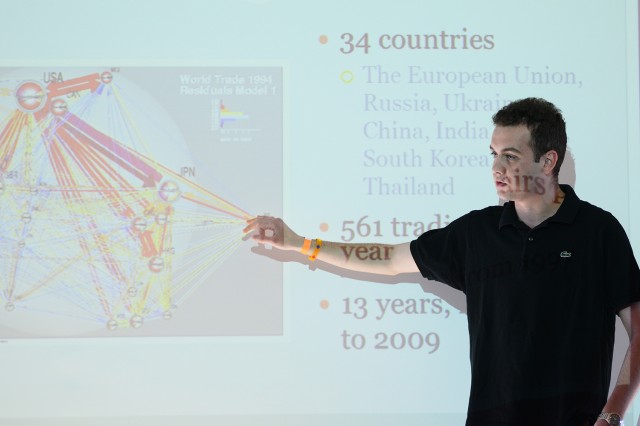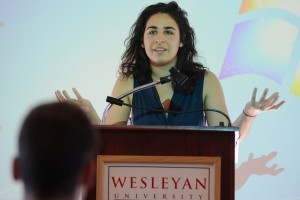13 Seniors Present Theses at Study for Public Life Presentation

The Center for the Study of Public Life’s profiled a range of Wesleyan senior thesis research projects on topics related to the study of public life on April 26.
The inaugural event featured 10-minute presentations by Wesleyan seniors whose 2012-13 thesis research represents an undertaking to pursue knowledge about public life in its broad definition.
Three students spoke about the topic “Regionalism, Nationalism, Infrastructures and Identity.”

Government major Katherine James spoke on “Policy and Planning for Large Water Infrastructure Projects in the People’s Republic of China,”a study of three water projects – the South-to-North Water Transfer Project, the Three Gorges Dam, and the Nu River Project- that explores how and why China has persisted with a policy of constructing mega-projects to assuage domestic water scarcity and supply issues, in spite of their high social, political, economic, and environmental costs.
Government major Ivan Stoitzev ’13 presented his research on “Everything Revolves Around Oil and Natural Gas: Russia’s Economic and Political Centers of Gravity,” during the Center for the Study of Public Life’s 2012-13 thesis research presentations on April 26. Stoitev investigated the role oil and natural gas play in the Russian economy and political sphere.
And history major Sophia Hussain discussed “The Derailed Power Broker: Rexford Tugwell’s American Crusade for Planning and Professional Authority,” a historical investigation of the agricultural economist’s public writings and his relationship to the New Deal, racial politics, and the building of America’s first Greenbelt Towns in the 1930s.
Four students discussed studies about “Policy and Political Processes.”
College of Social Studies major Caitlin Aylward presented “Food for People, Not for Profit: Justice and the Food Movement,” a study of how the predominant food justice, slow food, and food sovereignty movements are each a response to a respective element within a triad of distributional, recognition based and procedural injustices.

Government and philosophy major Sarah Cassell spoke on “Enacting International Moral Responsibility: The Normative Dynamics of Humanitarian Intervention,” a study setting out an analysis of the standards that would justify military intervention in other countries and analyzing the range of issues or questions that must be answered in deciding on and implementing such interventions. Cassell focused in particular on the case of Libya.
English major Jessica Jordan presented “Bloodlines,” a study of regional identity in the U.S. South, family history, and the uses of memory.
College of Social Studies major Jake Eichengreen presented “Can’t Buy Me Love: Development and Social Destabilization in Uganda,” a critique of the effects of micro-financing on Ugandan traditional culture, and suggestions for alternative economic models.
Also:
Government major Nicolas Cavallo spoke on “The American Response to the Russian ‘Opening’ of the 1990s: Oil Investment and U.S. Aid,” a study that aims to explore and elucidate the policy processes and coordinated networks of the U.S. government by defining the American energy relationship with Russia in the 1990s. Through both interviews and analysis of unclassified government documents, this research delves into the curious interaction between private energy corporations and public officials.
Anthropology and American studies major Maria Cory Meara-Bainbridge presented “Explaining Away Inequality: The Normalization of Segregation and Maintenance of White Privilege in New York City High Schools.” Her study focuses on the city’s unique high school admissions system, using historical and anthropological analysis to trace the shift from neighborhood schools to a citywide choice system, and the discursive shift that accompanied it, from a race-conscious discourse of integration to a colorblind discourse of market-based choice.
College of Social Studies major Sam Ebb spoke on “Government of the People: The Case for Compulsory Voting,” a multinational analysis of the effects of compulsory voting in democratic countries.
Science in Society major Bennett Kirschner discussed “The Ecology of Invasions and the Invasions of Ecology: Reevaluating the Disciplinary Program of the Invasion Sciences,” asks the questions: What broader ethical and philosophical frameworks does the idea of “species invasions” depend on, and how are these abstract ideas embodied politically?
American studies major Kim Ingebristen spoke on “Searching for the ‘Public’ in Public Schools: Stories of School-Based Community Organizing in Baltimore,” a study of the theory underlying the community action organization, the Industrial Areas Foundation, that is the successor to Saul Alinsky’s work in community organization, and how it worked out as they began organizing in public schools in Baltimore in the aftermath of the Civil Rights Movement.
And English major Andrew Zingg presented “Zingg by Zingg: A Grandson’s Seach for the Man Under the Hat.” Zingg writes about his grandfather, David Drew Zingg, was a prominent photographer, writer and culture-broker in Brazil from the 1960s to the 1990s who played a pivotal role in the introduction of Bassa Nova music to the U.S. and made a signal contribution to the visual record of Brazil’s public and cultural history in the second half of the 20th century.

